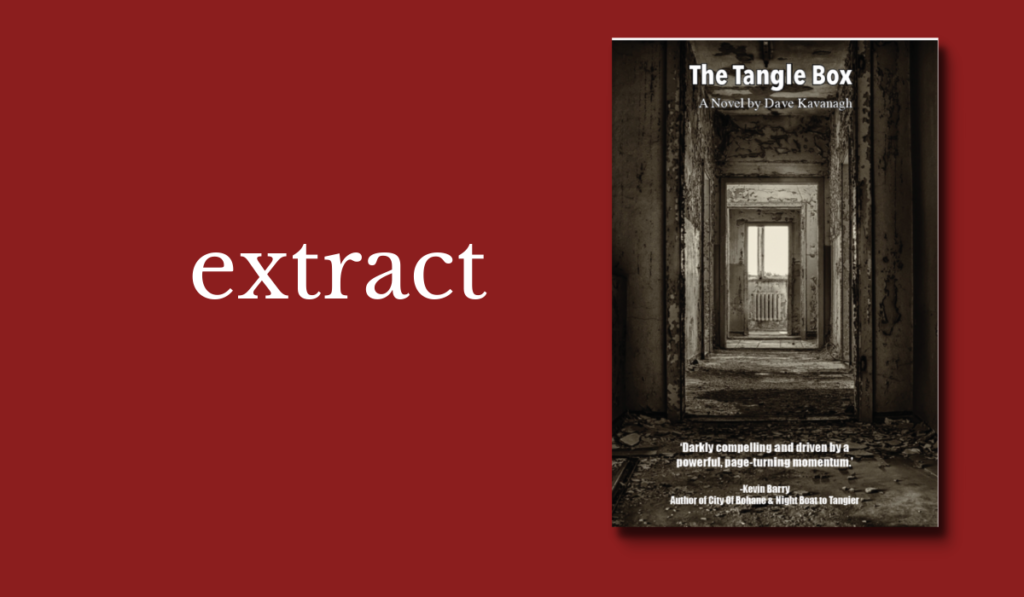
The Tangle Box|Dave Kavanagh|Chaffinch Press|ISBN: 9781838402549|€12.99
“Darkly compelling and driven by a powerful, page-turning momentum.”—Kevin Barry
The Beginning
This is where it starts. I’m a stranger in a dimly lit room, staring into a mirror. In the reflection I see three white kitchen units hanging on a bare wall and, closer in, a breakfast bar strewn with the things I abandon there — yesterday’s newspaper, folded over, the crossword complete. A fruit bowl, filled not with fruit but a car key, two bills, the stub of a cinema ticket and a hospital appointment card.
I move and the perspective swings to a bed folded into a wall, springs exposed, a white sliding door, and a coffee table with four books stacked on it: Capote, Melville, Atwood, Connolly.
I adjust my focus and regard the man staring back at me. His eyes are deep brown, almost black and set in hollows — jaded, Caroline would have called them — the eyes of a man older than my forty-five years. My hair is dark, still damp from the shower but it will dry as I walk to the station. My face is thin, just short of gaunt, and my skin pale from lack of sun.
My greying beard hides the damage to my jaw. My index finger traces a line from the softness beneath my chin to the edge of my left cheek, halting where the scar is visible, an angry red exclamation mark. When I press my finger hard against it, it fades, then reappears once I remove the pressure.
I’m wearing my best clothes. A white shirt, open at the neck (I don’t own a tie). It’s close fitting and tucked into faded blue jeans that fitted me once but are now two sizes too big. My belt looks wide on my narrow waist, and the buckle, bright when it was new, is now black and tarnished. I wear the only pair of shoes I own, of a soft brown leather, scuffed, but comfortable.
I turn and face the room. The estate agent advertised it as a studio. It is rectangular, but for a sectioned-off corner that breaks the symmetry. There, two drywall slabs conceal a toilet and a shower stall, all arranged in a space not much larger than an airing cupboard.
I’ve lived here for seventeen weeks, but it is not my home — it is a way station. I chose it because it suited my needs; it’s inexpensive and allows me access to public transport.
The studio is tucked into the rear of the building, far from the front entrance which means it is private.
The only window faces out over a park where grass and trees are visible through black railings. When I arrived in April, the birds woke me each morning with their busyness. Now they’ve quietened, or I’ve become accustomed to them.
The people who come to the park arrive in shifts. Old men are the first, men who no longer work but still rise early, driven by habit or the need to do something; in the afternoon it is young mothers pushing prams or trailing young children. The evening group are loud and raucous, teenage boys, prowling like slouched predators, or girls, flocking like exotic birds, loud and bright. On weekends, I sit and watch them as they pass; I wonder at their sameness and the wonderful ordinariness of their lives.
In the in-between times, the late mornings and the afternoons, the park is empty.
I check my watch, it’s 8.15 am. My jacket hangs by the door. I put it on, and then I take the crutch. I will walk the last stretch, so I will need it.
***
They subdivided the original house into four apartments and the studio I rent. It sits on a rise. I exit through the one-way door at the back of the building and pause. In front of me the sea shimmers, reflecting the washed-out blueness of a late August sky. In the near distance is the island, the smooth curved greens of the links at its centre, and at its edge, the bright whiteness of sand that sits like a bright carcanet above the tide line. The space between is rough grass, bleaching to an autumnal gold; it sways in the breeze, mimicking the sea. I breathe in the smell, mud and salt, and it overpowers the tang of the city behind me.
I turn and walk along the path at the side of the building, passing the car I have used only once in the previous month.
On the street that fronts the building, the daily parade of commuters is making its way towards the station: a man in a light overcoat, head down, briefcase in hand; a woman in sensible red shoes, rushing by; a boy cycling past, whistling. I join them, my crutch scuffing the sunlit pavement.
The weight of the day descends. I feel the letter tucked into the front pocket of my jeans, its sharp edges digging into the skin between my hip and pelvis, where angry purple scars line the hollow.
***
At the station, people stand waiting, some chatting in groups, others alone or holding takeout coffee cups, avoiding eye contact. A girl wears earphones, dancing in place, her face distant as though the music transports her to somewhere less mundane. I move along the platform, away from the tinny repetitive beat.
People see the crutch, not me; they move aside and give me room to pass and I find a clear section of wall to lean against. My leg is already aching and I regret not driving into the city.
An electronic noticeboard announces the train times in red letters. My train will come in seven minutes. I withdraw the letter. The crease lines along the folds are darkening, I’ve read it so many times I can recite the words by heart, but I unfold it and read it again.











